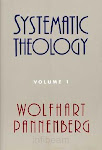(or Externality vs. Internality)
Political theory #1:
Matter vs. SpiritPolitical theory #2:
Origin of Change--Law or Conscience?Political theory #3:
Christian Politician's DilemmaMy thoughts are still very muddled, but I thought I'd anyways give it a go and try to communicate the first of the three theoretical problems in politics as I see them. I'm hoping that even a semi-successful formulation of the issue will help me proceed a few steps towards its solution.
The dilemma arises out of two truths that, taken separately, seem intuitively quite solid but that, taken together, seem contradictory. If it's a real contradiction one of the truths is a fallacy. If it's only an apparent contradiction - that is to say, a paradox - my anxiety is lessened but I'd still very much like to get to depths of it.
The first truth is this. A perfect society shall never come about by simply making some adjustments, rearranging society here and there, or fixing other external factors. The other side of this truth is that the problems of society can never be reduced to (explained by) simply societal maladjustments, disorganization, or some other superficial factors. The belief that they can is a key fallacy of all secular world-views, be they Marxist or western democratic utopias that stem from Enlightenment ideas.
T. S. Eliot expressed it this way: "Some dream of a such a perfect society, that it is no longer necessary for us to be good." Herein lies the wisdom that counterbalances secular thinking's folly. The problems of life are not ultimately technical, they are moral. They stem from the heart of man, the disorder from within, not the disorder from without. Christian tradition calls it the Original Sin. No matter how great the structure, no matter how educated, wealthy or cultured the society, everything comes tumbling down eventually. And the corrupt people make it to the top, or the top corrupts the people that make it there, whichever way it is.
The second truth is this. Taken the fact that the ultimate source of human misery, both on the individual and collective level, is a fundamental flaw
in us, it is yet true that in some societies it is easier to be a "good person" than in others. Some have expressed it this way: a good society is a society in which the good man finds it easy to be good, and a bad society is a society in which the good man finds it difficult to be good.
Take, for instance, a country where a given vice is prohibited. I would suspect that in this country it is easier to avoid the vice and practice the virtue opposite to it. Or take a wealthy country - chances are that there is less social unrest or war in that country than in its poor neighboring country. Poverty is a cause of other social problems. Take away poverty and various blessings will follow. All this, however, seems to suggest that there is an element of truth in Marxist etc. ideas.
Now, at first the first truth - that perfecting society on the structural level won't erase wickedness from life - seems to present the legislator or politician (or any good willed person, for that matter) a problem. If it won't work, what's the point in trying to perfect society then? I have explained
here why I think we ought to do our best to work for a better society and why a certain form of "perfect society" does, in fact, exist logically and potentially in practice too. But this is not the point I'm trying to make here.
The first truth - perfecting society won't erase wickedness - seems to be in contradiction with the second truth - perfecting society will lessen wickedness (make it easier to be good).
What's up with this? Is one mistaken? If not, can their interplay be explained more satisfactorily? What constitutes the apparent contradiction? Is there a level to this paradox that simply must be accepted by faith, or can we by making qualifications weaken the aura of mystery? What effect (if any) ought it have on the politician's thinking and acting?
I find this whole question very difficult. I'm not even sure that I nailed it. Hopefully I'll do a better job with the two other dilemmas to which I'll return later.











